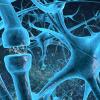Most fascinating... It's too bad Lostfalco is MIA, since his experience, if he did receive it, would have been most interesting. I see great potential in this - modulating the brain in a very non-invasive way - theoretically it could be very accurate and very low on side-effects.
I'm thinking the ALZ and anxiety/OCD patients may be the first to experience benefits - but once we know more...!
Imagine, as an ADD-er... wearing a specialized helmet - at times - composed out of individual modules, composed out of soft-body semi-organic nano-electronics, which you can fold, assemble and disassemble, and adapt to the task at hand - need focus? Use the section for your frontal lobe. Need motivation? Use the section for your posterior cortex.
And so on, and so forth. It could be a fantastic kit, for both clinicians and patients.
A semi-organic device is definitely the way to go - the soft-body electronics (most of you have this in the OLED-screens of your smart-phones for instance) will make it more durable, and semi-organic battery-packs, such as the ones based on genetically engineered algae, which are being developed as we speak, should be much easier to make soft-body than traditional lithium-batteries.
But enough! I'm getting lost in engineering dreams, as always.
Has anyone actually tried this, for a mental or neurological condition, here on Longecity? Describe your experiences, please.
Edited by Stinkorninjor, 16 August 2015 - 11:36 AM.























































